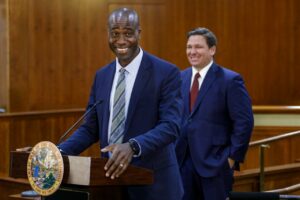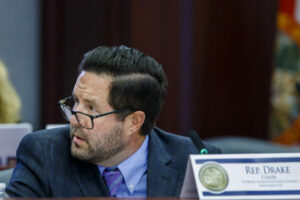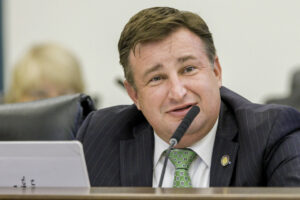
Welcome back to Diagnosis, a vertical that focuses on the crossroads of health care policy and politics.
The final countdown is here. Legislators have just two weeks left to wrap all their work from the 2022 session, meaning it’s going to be a hectic race to the finish. Most committees are done for the year, and if a bill isn’t ready to go to the House or Senate floor, it is likely dead.

One checked-off item was the confirmation vote this past week of State Surgeon General Joseph Ladapo. Democrats sharply criticized Ladapo as a “yes man” for Gov. Ron DeSantis and assailed the Harvard-trained doctor over his skepticism over vaccines and masks. But the Republican majority stood by the Governor’s contentious nominee and delivered a win for the Governor.
But let’s take a peek at some of the Governor’s other health care priorities and where they are with the clock ticking down.
I welcome your feedback, questions, and, especially, your tips. You can email me at SextonHealthNewsletter@gmail.com or call me at 850-251-2317.
— BUDGET BLUES? —

Let’s start with the budget, which will have the heavy lifting next week. The House and Senate expect to finally commence formal budget negotiations in the next few days with a hard deadline looming. Thanks to Florida’s 72-hour “cooling off” period, lawmakers much finish the budget by March 8 to end the Session on time.
Legislators haven’t yet embraced some of DeSantis’ critical budget recommendations made before Session, including a $1 billion gas tax moratorium or the second round of $1,000 bonuses to first responders. It’s been the same story with some of his health care budget recommendations.
The Governor, for example, recommended that the Legislature continue to provide $300 million in recurring dollars to hospitals that offer the most amount of Medicaid care in the state. House and Senate budget writers did not heed the call, but top DeSantis administration officials supported the request. Agency for Health Care Administration Secretary Simone Marstiller met this past week with hospital CEOs to reinforce their support.
Other remaining items include increased funding for cancer research care — a priority for First Lady Casey DeSantis — which also hasn’t made it into the budget. DeSantis also asked for a $10 million boost in spending on Alzheimer’s research, which was not matched in the House and Senate budgets.
To be clear, other spending priorities made it into the initial budgets, including money for the still on-hold Canadian drug importation program. The Senate has gone along with a proposed $20 million increase in mental health initiatives in public schools, but the House did not pick up that recommendation.
— SPEECHLESS —

DeSantis this Session also threw his support behind bills to prevent the Department of Health from cracking down on doctors accused of spreading misinformation about COVID-19. He even posted on his Twitter account earlier this month that “physicians in Florida should be able to practice. medicine and express opinions without facing sanctions simply because they are not parroting the prevailing ‘narrative.’”
But as of right now, it appears that the bills that the Governor touted are unlikely to make it across the finish line. SB 1184 is not on the final bill agenda the Senate Appropriations Committee will consider this week. Likewise, HB 687, its counterpart, is not on the final schedule of bills that the Health & Human Services Committee is considering.
The bills were proposed after regulators started to scrutinize information being posted about COVID-19 by physicians and other health care professionals.
House bill sponsor Rep. Brad Drake said he filed the bill after hearing about physician Joel Rudman. Rudman testified in committee that the American Board of Family Medicine tried to act against him after making comments about the COVID-19 vaccine. A complaint was also filed with the Department of Health against State Surgeon General Ladapo, but it was never pursued.
The House Professions and Public Health Subcommittee advanced the bill after deleting a $1.5 million fine the Department of Health could face if it violated a practitioner’s right to free speech. But the legislation — which organized medicine groups do not support — has stalled.
— MEDICAID MESS? —
Still up in the air: Can the Florida Legislature come together and give the Agency for Health Care Administration the statutory changes it says are necessary to help ensure the third round of securing major contracts to run the mammoth health care safety net program runs smoothly?

On Monday, the Senate Appropriations Committee will consider its version of the Medicaid managed care rewrite, SB 1950. Bill sponsor Sen. Jason Brodeur has filed four amendments to his bill that tweak the Medicaid managed care regions and the number of health plans in each region that can be awarded multiyear Medicaid contracts worth tens of billions of dollars.
The amendments have the cumulative effect of halting the proposed merger of Medicaid Regions 5 and 6 into a larger area and changing the number of Medicaid-managed medical assistance and Medicaid long-term care plans the state can contract within those areas. Brodeur’s amendment would also increase the number of MMA and LTC plans that could be contracted within Region 5, upping it from the four-plan maximum to a six-plan maximum. Conversely, Brodeur’s amendment decreases the maximum number of plans contracted from a maximum of seven plans to a maximum of four.
Brodeur hinted a week ago that the Senate might not keep to the eight regions that AHCA had initially proposed. Brodeur’s move to change the number of districts adds to the number of differences between the House and Senate managed care bills. While the House last week backed off its push to require MMA and LTC plans to provide dental services, the House continues a push to require all “essential” hospital providers to contract with every Medicaid-managed care plan in the state.
— FLORIDA FREEDOM —
It’s being called the “No Patient Left Alone Act.” On Monday, the Senate Appropriations Committee will take up SB 988 but tack on an amendment that rewrites the bill to eliminate the potential workload increase for AHCA.
The bill currently requires hospitals, nursing homes, ICFDDs, group homes, assisted living facilities, and other institutional providers to adhere to statewide visitation rules (which have yet to be developed.) Providers are authorized to establish alternate visitation protocols if there is a health or safety concern. The alternate visitation protocols must be submitted to the state annually for approval. AHCA is required under the terms of the bill to dedicate a webpage to explaining visitation rights and provide a method for individuals to report to AHCA any alleged violations of the rights.

The bill means to address disparate visitation policies across Florida’s health care sector. While the federal government has guidelines that impact facilities that receive Medicare and Medicaid funding, other providers, such as ALFs, are not federally regulated and operate solely under a license issued by the state.
AHCA estimated that 16,816 licensed entities that serve clients would be required to develop alternative visitation policies. AHCA would also need an additional 43 employees, including six senior attorneys, to review and approve the guidelines, inspect providers for violations and prosecute complaints. AHCA estimated that there could be as many as 2,500 visitation complaints against providers annually.
An amendment to the bill requires long-term care providers and hospitals and hospices to establish visitation policies that address infection control and prevention. The bill clarifies that the visitation policies cannot require visitors to submit proof of any vaccination or immunization and must allow visitors to physically touch the patient unless the patient objects.
The policies must be submitted to the state during the initial licensure process and licensure renewals. The procedures must be developed within a month of the bill being signed into law. Moreover, once developed the policies must be posted on the providers’ homepages within 24 hours.
The House is taking up its version of the bill, HB 987, Monday in the Health & Human Services Committee. The amendment is similar but not identical to what the Senate is considering.
Republished with permission [/vc_message]












